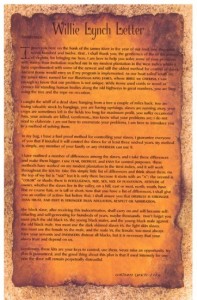More Black History, Less Black Mythology
Every Black History Month there are a slew of pieces on why the month is irrelevant, unnecessary, etc. This is not one of them! I think Black History Month remains an imperative but I hope that we will deepen our understandings of our ancestral past so that we pave way for a different understanding of our people and the future. Unfortunately, the rush to get our history into a 29 days (it’s a leap year) will lead to a lot of misinformation. Let’s see if we can disenroll ourselves from the Willie Lynch School of Social Research. 
It’s Black History Month and as both a professor and a lover of Blackness, Black things and Black people, I want us all to study up. Just make sure you don’t enroll in The Willie Lynch School of Social Research. Now some of my pro-Black, head wrap rocking friends who are very passionate about Black history 28-29 days a year are nodding their heads right now because they’re familiar with Willie Lynch and think I’m about to berate folks for taking up his ways. These are the alumni of that school I so desperately want to shut down.
For those who are unfamiliar, there is a notorious letter- “How to Make a Slave”- that was said to have been read by a slaveholder named Willie Lynch on the bank of the James River in 1712. The document explains how slaveholders should keep the various enslaved Africans of their plantations at odds with one another to ensure that they are never able to revolt and to keep the psychological chains on their “property” as tight as the physical ones. The colloquialisms used and the improbability that someone would have ever presented such a plan that effectively predicted the long-term effects of slavery (for example, our issues with complexion) have long been used by scholars and researchers to refute the authenticity of the document. But you can still find copies of it and even films devoted to explaining how it manifested in Afrocentric bookstores across the country.
The Willie Lynch myth is just one example of the lazy “research” we tend to do online about our community, forward to others or, worse, try to convince our children of. If we want to Black history to be known, felt and understood, we as adults have some work to do! Read more
Filed under: Ancestors, Food for Thought, memory, Race, Youth


